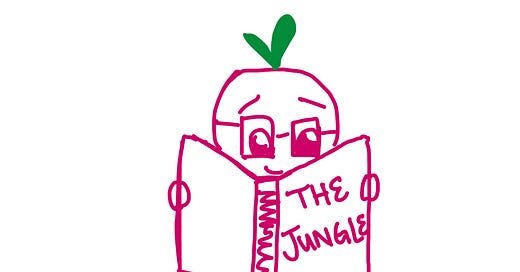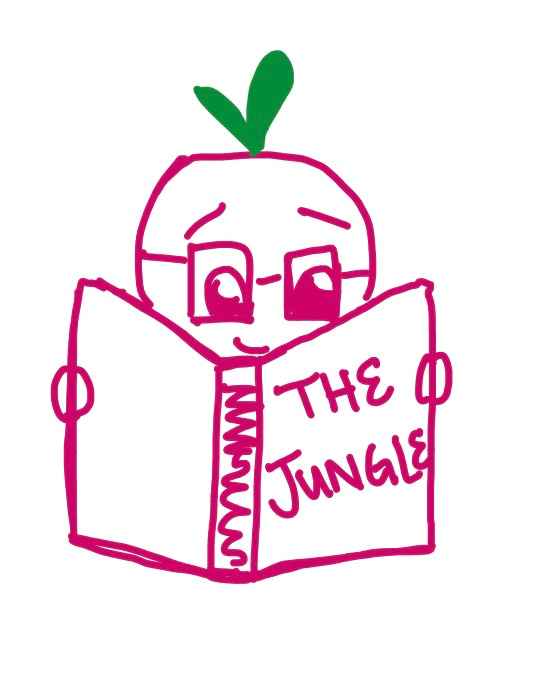I Read "The Jungle" So You Don't Have To
Reflections on the Novel that Shaped the Food Industry
Having studied food systems for the past eight years, I figured it was about time for me to read the novel that helped shape them: The Jungle.
Ask someone to summarize the book, and you’d probably get a, “it’s about the meatpacking industry I think?...” and “we had to read it in 7th grade.” *shudder*
But as I read the book, I realized that it is so much more than just about the meat industry, but rather a nuanced take on the political rumblings and oppression facing the U.S. immigrant’s life. Though written in 1905, its themes continue to resonate today.
*P.S. This is all the opinion of someone who did not read the book in school, but rather for “funsies.”
the context
Upton Sinclair was born in Baltimore, MD (woot woot) in 1878. He considered himself a poet, but was also known as an author, film writer, and journalist. He was a staunch socialist and sought to promote his ideas through his various writings and political efforts. He is most known for his novel, The Jungle, which he published in 1905 in chapters through the socialist newspaper Appeal to Reason (similar to Charles Dickens’ Great Expectations).
Leading up to its writing, the 26-year-old Sinclair spent seven weeks in Chicago’s oppressive meatpacking industry.
His goal? To reveal the oppression of a capitalist system and promote socialism.
His impact? A revolution of the food industry and policy.
the content
What’s it really about? While you could find an overview on Wikipedia or YouTube, here’s the quick outline: Jurgis Rudkus, an immigrant from Lithuania, and his family of 10-ish members immigrate to the United States and find themselves starting their new lives in Chicago’s stockyards. The book begins with Jurgis’ wedding to Ona, where they begin in high spirits celebrating with their loved (and not so loved) ones. Yet we already feel the mounting financial pressures: the couple getting scammed by the bar, paying for the expensive wedding, and Ona stressing about work the next day. Jurgis tells his new wife to skip work and promises to her, “Leave it to me, leave it to me. I will earn more money – I will work harder.” This refrain continues through the novel, and we watch this strong man come against his limits and get crushed under the machinery of the system.
the unexpected
The stockyards were, of course, quite memorable due to Sinclair’s detailed description of the gruesome conditions. What I did not expect was that the meatpacking content only took up approximately 60% of the novel. The rest of it was spent describing Jurgis journey as a steel worker, homeless man, traveling tramp, English student, prisoner, and political advocate. In fact, he probably held ~10 different jobs throughout the story in various locations inside and outside of Chicago. Along the way, there were sections where Jurgis finds respite in political campaigns, where socialist leaders promoted their ideas, the workers went on strike, and Jurgis engaged in socialist efforts.
What’s interesting is that Sinclair did not explicitly define socialism so much as demonstrated what happened when it was not adhered to (Jurgis et al face oppression, stress, financial hardship, death) versus when it was (Jurgis is happy and wealthy). Per definition, socialism is a political doctrine that calls for public ownership of resources rather than individual. Socialists argue that this philosophy encourages cooperation between groups and reduces systemic oppression. (see: Brittanica for more).
As a general read, I found The Jungle to be paced in an engaging way, particularly in the first half of the novel. The fact that it was published in chapters helped shape the writing to be memorable/shocking enough to keep its readers’ attention. But *spoiler alert* once Ona died in childbirth, I (like Jurgis) honestly didn’t care what happened next. So, as he thereafter abandoned his remaining family and roamed the countryside as a tramp, so I found my interest wandered away, too. The text also became more “preach-y” as Jurgis grew more entrenched in the political movement and Sinclair used the political speeches to expound on the virtues of socialism (the last political dialogue lasts for 13 pages without a break).
But who am I to judge.
the impact
Here’s an oft-quoted statement by Sinclair, “I aimed at the public’s heart, and by accident I hit it in the stomach.” His vivid imagery of the stockyards revealed the unhygienic conditions of the industry, including its usage of diseased animals in sausages, the mixing of chemicals into milk, labor exploitation by authorities, and unhygienic working and living conditions.
This was the spark that catalyzed the Food Purity Movement in the United States. In 1906 (1 year after publication!), President Roosevelt signed the Meat Inspection Act, which set standards for meat processing and prohibited companies from mislabeling or altering their products. The Pure Food and Drug Act later followed, created by the FDA, and limited the manufacturing or adulteration of foods, medicines, and liquor.
the takeaways
While I could continue waxing on about The Jungle, I’ll share my key takeaways below:
Stories & writing have power → Narratives capture the imagination, shape thoughts, and ultimately become action.
The best things are often unplanned → No one could have guessed the impact of The Jungle! Not even the author himself.
Policy can move quickly when catalyzed by the force of public perception → In the case of The Jungle, it led to public outrage over the meat industry which pressured officials (including the President) to implement reforms.
It’s wild that more than a century later, The Jungle still echoes in today’s headlines; whether it’s disease outbreaks in our meat products or the ongoing labor & animal exploitation in agriculture. It’s not just a historical novel – it’s a mirror.
If you haven’t already, I’d recommend picking up the book and giving it a read (or a re-read)! I’d love to hear your thoughts 🤓






I read The Jungle a few years ago. I was struck by the family trying to take care of themselves but failing again & again. In particular the sausages that were mostly wood shavings stuck with me - both that is was accepted by society & that even when they could afford meat, they got scammed. I also found my interest waning after the umpteenth financial disaster befell them…the not learning, not adapting, not learning English so they could take care of themselves …it just got too sad.
You’re a writer! 👏
Not sure my stomach will be able to handle the book after reading your recap lol but maybe one day…